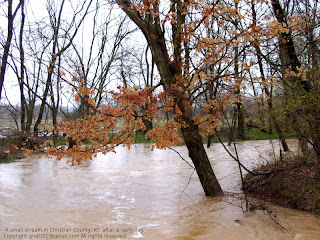Deep and wide enough for travel
I took this picture last week, during an all-day rain. I didn't hear about any major flooding problems around our area, but the streams were certainly running full.
This little stream, Warrens Fork in Christian County, KY, has appeared on the blog before. It's a tributary of the South Fork of the Little River.
In the early days of Kentucky and elsewhere, along creeks like this one, people depended on high water to take their goods to market. They built their canoes or small flatboats ahead of time so they were ready to go when the water rose.
Then, during a freshet like the one we just had, they floated downstream with their bundles of furs, smoked meats, and whatever else they had to sell. On some of these crooked, winding little streams, it must have been a wild ride.
It may be hard to imagine traveling such a small stream, but it was a common practice.
Their [the flatboats'] cheapness and shallow draft enabled them to carry freight on most creeks worthy of the name. The produce was loaded while the creeks were more or less dry; then when a freshet occurred, they were floated to the nearest river.
Quoted from p. 849 of The Encyclopedia of Louisville. Edited by John E. Kleber, University Press of Kentucky, Lexington, 2001.

4 comments:
Never would have thought of launching in the flash flood, except that I've seen kayakers relishing the challenge after a big rain.
I read a transcription of a slave's memories of riding the freshets on flatboats. He said that they were always fighting the current for control of the flatboat, and when the current had control, they ripped downstream at a terrifying rate. I am sure there was a major adrenaline rush.
The book Indiana and Indianans has a chapter about early transportation in which the flatboat plays a major part.
The following is from page 929 (italics added):
"The steamboats solved the transportation problem for the people adjacent to the Ohio River and the lower Wabash, but for years the settlers that were more inland relied on flat-boats, which could be run out of any creek of moderate size during a freshet, and a freshet could be relied on at least once or twice a year. It was on account of this flat-boat navigation that the numerous laws appeared in the earlier statute books concerning navigable streams, which have often roused the curiosity, and at times the amusement of readers of later days.
"But that was one respect in which our ancestors had a great deal more common sense than the present generation. The framers of the Ordinance of 1787 saved the ownership of these streams to the public... that: 'The navigable waters leading into the Mississippi and St. Lawrence, and the carrying places between the same, shall be common highways, and forever free... without any tax, impost, or duty therefor...'
"In the original land surveys, the surveyors were instructed to note these navigable streams, and survey them out, by metes and bounds; which they did, and they were never included in the land sales — the adjacent lands being sold in fractional sections, by the metes and bounds established."
In another account (I don't remember the source right now,) I read about the flatboat passengers grabbing overhead tree branches to slow down the boat. Then they would try to get a rope around a tree, so they could pull in for the night. That sounds exciting, too. What if the boat just left you hanging to the tree branch and went on downstream?! I'll bet you'd never see your boat again.
That is definitely my nightmare!
Post a Comment